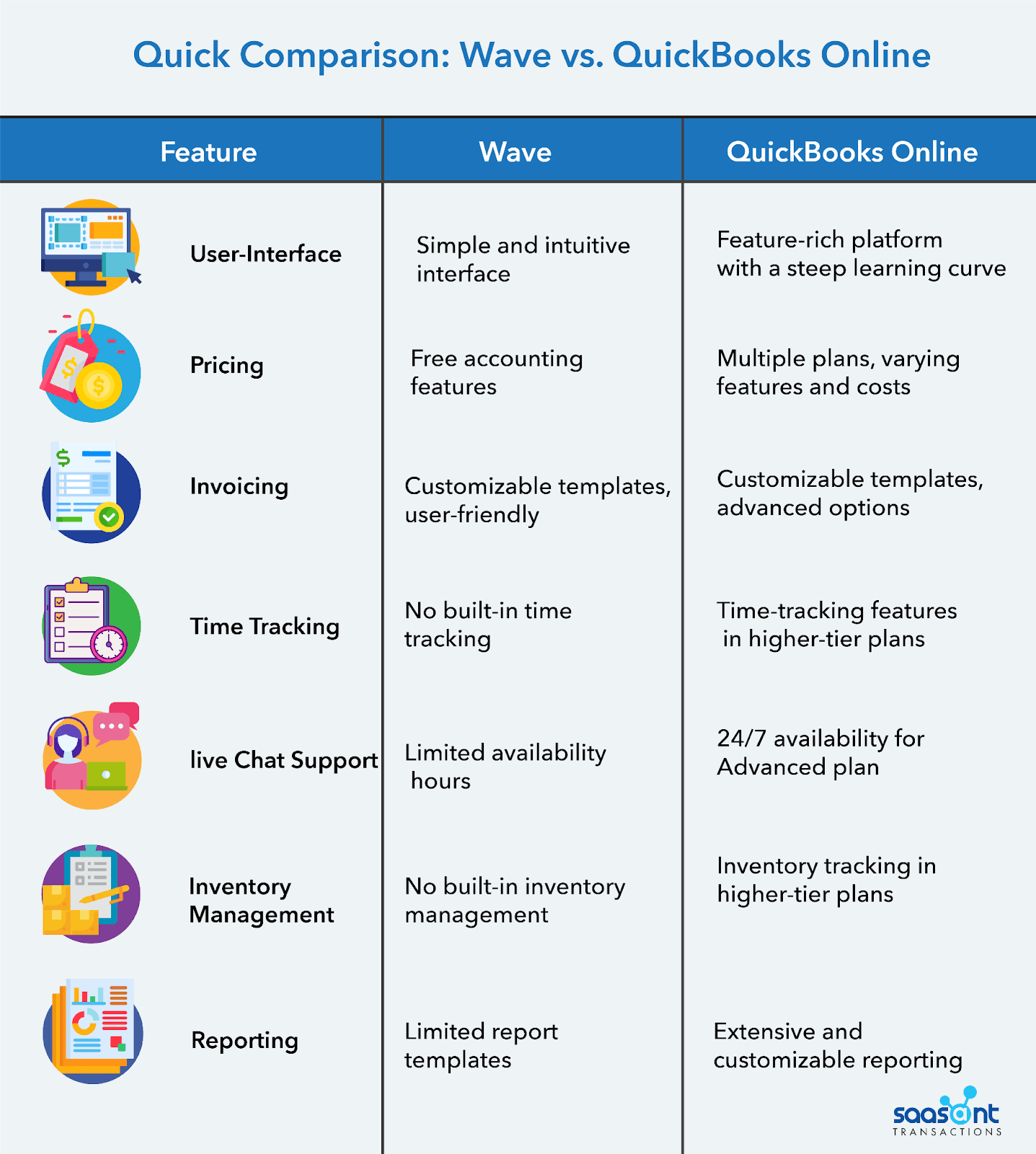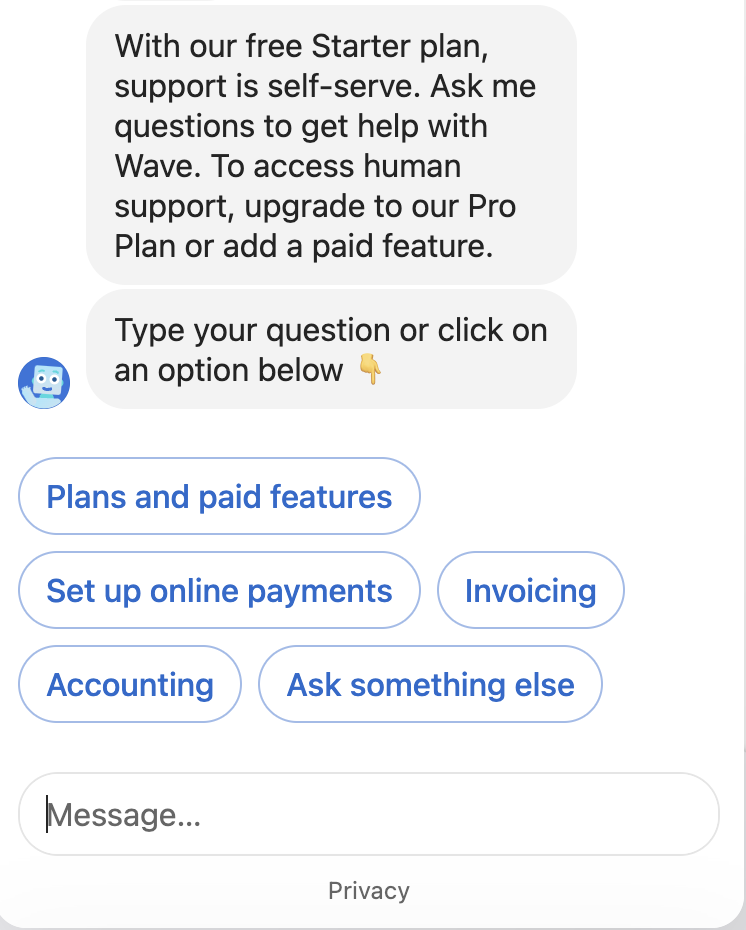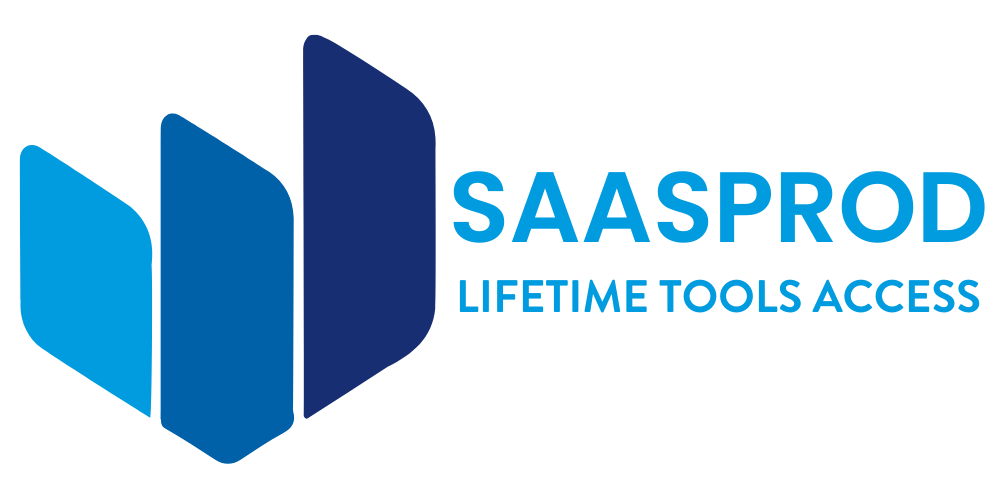Choosing the right accounting software can be tough. Wave Accounting and QuickBooks are popular choices.
Both offer free and paid options. Understanding their differences helps you decide which suits your needs. Wave Accounting is known for its free services, perfect for small businesses and freelancers. QuickBooks, on the other hand, offers more features but comes with a cost.
In this post, we’ll compare both platforms. We’ll look at their free and paid plans. This will help you understand which is the best fit for your business. Stick around to get a clear picture of what each software offers.

Credit: www.saasant.com
Pricing Comparison
Choosing the right accounting software often depends on the pricing. Both Wave Accounting and QuickBooks offer different pricing structures, catering to various needs. This section will break down the pricing options for both platforms, highlighting their free and paid plans.
Wave Accounting Free Plan
Wave Accounting offers a completely free plan. Users can access essential features without any cost. This includes invoicing, expense tracking, and receipt scanning. There are no hidden charges. Small businesses on a budget will benefit from this plan. The free plan also includes basic financial reports.
Quickbooks Free Trial
QuickBooks provides a 30-day free trial for new users. This allows full access to its features. Users can explore invoicing, payroll, and expense tracking. The trial helps determine if QuickBooks fits their needs. After the trial, users must choose a paid plan.
Paid Plans And Pricing
Wave Accounting has optional paid services. These include payroll and payment processing. These services come with separate fees. For example, payroll starts at $20 per month. Payment processing fees are per transaction.
QuickBooks offers various paid plans. The Simple Start plan costs $25 per month. The Essentials plan is $50 per month. The Plus plan costs $80 per month. Each plan includes more features and users. Advanced plans offer more robust reporting and support. Small to medium businesses might prefer these plans.
Features Analysis
Choosing the right accounting software is crucial for your business. Wave Accounting and QuickBooks are popular options, each with its own set of features. This section will provide a detailed features analysis of both platforms. This helps you make an informed decision about which is best for your needs.
Core Features Of Wave Accounting
Wave Accounting offers free basic accounting features. Users can manage invoices, track income and expenses, and generate financial reports. Bank reconciliation is simple and easy to use. Wave also supports multiple currencies. It offers receipt scanning through its mobile app. Wave Payments enables you to accept credit card payments. Payroll features are available but come with an extra cost.
Core Features Of Quickbooks
QuickBooks provides a range of features for small to medium businesses. Invoicing and expense tracking are standard. It offers comprehensive reporting tools. Bank reconciliation is efficient. Users get access to project management tools. QuickBooks supports multiple currencies. Receipt scanning is available through the mobile app. It also integrates with many third-party apps. Payroll is included but varies with the plan you choose.
Advanced Features
Wave’s advanced features are limited in the free version. You need to pay for payroll and payment processing. QuickBooks, on the other hand, offers advanced inventory management. Users can track sales and profitability by project. The advanced plan includes time tracking and bill management. It also offers enhanced reporting and analytics. QuickBooks provides advanced customization options. Users can tailor reports to their specific needs. Multi-user access with different permission levels is a plus.
User Experience
When comparing Wave Accounting and QuickBooks, the user experience is crucial. It influences how easily users can navigate the software, get support, and how satisfied they are overall. Below, we will explore the user experience aspects of both free and paid options for these two accounting solutions.
Ease Of Use
Wave Accounting offers a clean and intuitive interface. Users find it simple to navigate and perform basic accounting tasks. Wave’s dashboard is user-friendly, showing all important financial information at a glance.
QuickBooks, both free and paid versions, also provides an easy-to-use interface. However, it offers more advanced features, which can make it slightly more complex. QuickBooks’ dashboard is customizable, allowing users to tailor their experience.
Overall, both software options are user-friendly. QuickBooks might take longer to master due to its more comprehensive features.
Customer Support
Wave Accounting provides customer support through email and a vast knowledge base. It lacks phone support, which can be limiting for some users.
QuickBooks offers more robust customer support options. Paid users can access 24/7 phone and chat support. Free users have access to community forums and a knowledge base.
The level of support can be a deciding factor. QuickBooks’ paid option offers more immediate and varied support channels.
User Reviews
Many users praise Wave Accounting for its simplicity and cost-effectiveness. They appreciate the free features, making it suitable for small businesses and freelancers.
Users of QuickBooks often commend its extensive feature set and reliability. Paid users particularly highlight the value of customer support and advanced tools.
Both tools receive positive reviews, but the choice often depends on the specific needs of the business.
| Aspect | Wave Accounting | QuickBooks |
|---|---|---|
| Ease of Use | Simple and intuitive | More features, slightly complex |
| Customer Support | Email, knowledge base | 24/7 phone, chat, community forums |
| User Reviews | Praised for simplicity | Praised for features and support |
Integration Capabilities
Wave Accounting offers basic integration features for free, while QuickBooks provides more advanced options in its paid plans. Both platforms enable seamless integration with various apps and services.
Integration capabilities play a crucial role in accounting software. They help connect your accounting tools with other systems. This saves time and reduces errors. Let’s explore how Wave Accounting and QuickBooks compare in this area.Third-party Integrations
Wave Accounting offers limited third-party integrations. It supports essential apps like PayPal and Shoeboxed. These integrations help streamline invoicing and expense tracking. QuickBooks, on the other hand, boasts a vast range of third-party integrations. It connects with over 650 apps. This includes popular tools like Salesforce, Shopify, and TSheets. These integrations enhance functionality and provide a seamless workflow.Mobile App Compatibility
Wave Accounting has a mobile app for iOS and Android. The app offers basic functions like invoicing and expense tracking. Users can snap photos of receipts and manage their finances on the go. QuickBooks also has a mobile app available for iOS and Android. The QuickBooks app provides a more comprehensive set of features. Users can manage invoices, track expenses, and even run reports from their mobile devices. This level of functionality makes it a strong contender for businesses needing robust mobile capabilities. “`Security And Compliance
When comparing Wave Accounting and QuickBooks, security and compliance are crucial. These platforms handle sensitive financial data. So, they must ensure robust security measures. They also need to comply with various regulations to protect user information.
Data Security Measures
Wave Accounting employs bank-level encryption. This ensures data is secure during transmission. It also uses secure servers to store information. QuickBooks also uses advanced encryption technology. It adds an extra layer of security with multi-factor authentication. Both platforms regularly update their systems. This helps to protect against new threats.
Compliance With Regulations
Wave Accounting complies with various financial regulations. It adheres to industry standards for data protection. This includes GDPR for users in Europe. QuickBooks also follows strict compliance measures. It meets the requirements of SOC 1, SOC 2, and SOC 3. Both platforms ensure they are up-to-date with changes in regulations.
Understanding these security and compliance measures is essential. It helps users choose the best accounting software for their needs. Both Wave Accounting and QuickBooks take these responsibilities seriously. This ensures user data remains safe and compliant with laws.

Credit: www.waveapps.com
Pros And Cons
Choosing between Wave Accounting and QuickBooks can be tough. Each offers free and paid options with distinct advantages and limitations. Understanding the pros and cons will help you make an informed decision.
Advantages Of Wave Accounting
Wave Accounting offers a free plan with many features. You can track expenses, create invoices, and manage receipts. It also includes double-entry accounting. This is helpful for small businesses. Another plus is its user-friendly interface. It’s easy to navigate and use, even for beginners.
Advantages Of Quickbooks
QuickBooks provides both free and paid plans. The paid plans offer advanced features. These include payroll management, inventory tracking, and detailed financial reports. QuickBooks also integrates well with other software. This makes it a versatile choice for businesses of all sizes. The customer support is excellent, providing help when needed.
Limitations Of Each
Wave Accounting has its drawbacks. The free plan lacks advanced features. There is no payroll management or inventory tracking. Customer support is limited for free users.
QuickBooks, on the other hand, can be expensive. The paid plans might be costly for small businesses. The interface might be complex for new users. This could lead to a longer learning curve.

Credit: zapier.com
Frequently Asked Questions
What Are The Main Differences Between Wave And Quickbooks?
Wave offers free accounting tools, while QuickBooks provides both free and paid options. QuickBooks has more advanced features and integrations. Wave is ideal for small businesses, whereas QuickBooks suits growing businesses needing more functionalities.
Is Wave Accounting Truly Free To Use?
Yes, Wave Accounting is completely free for its core features. Users can access invoicing, accounting, and receipt scanning without any cost. However, optional services like payroll and payment processing come with fees.
Does Quickbooks Offer A Free Version?
QuickBooks offers a 30-day free trial for its paid plans. This allows users to test its features without commitment. After the trial, users must subscribe to a paid plan to continue using the service.
Which Software Is Better For Small Businesses?
Wave is better for small businesses with basic needs due to its free core features. QuickBooks, with its advanced tools and scalability, suits growing businesses requiring more comprehensive accounting solutions.
Conclusion
Choosing between Wave Accounting and QuickBooks depends on your business needs. Wave offers free features, perfect for small businesses. QuickBooks provides more advanced tools, but at a cost. Consider your budget and required features. Both have their strengths. Evaluate carefully to make the best decision.
Your business success relies on efficient accounting. Make the choice that aligns with your goals. Happy accounting!


